Module 3 On the radio>>全模块复习课件
文档属性
| 名称 | Module 3 On the radio>>全模块复习课件 |
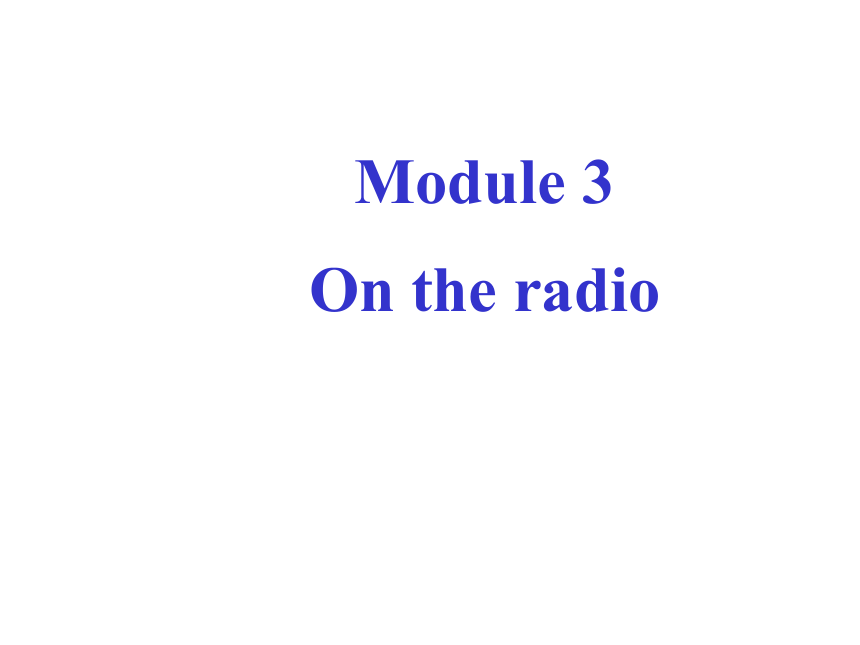
|
|
| 格式 | rar | ||
| 文件大小 | 863.4KB | ||
| 资源类型 | 教案 | ||
| 版本资源 | 外研版 | ||
| 科目 | 英语 | ||
| 更新时间 | 2012-02-12 00:00:00 | ||
图片预览

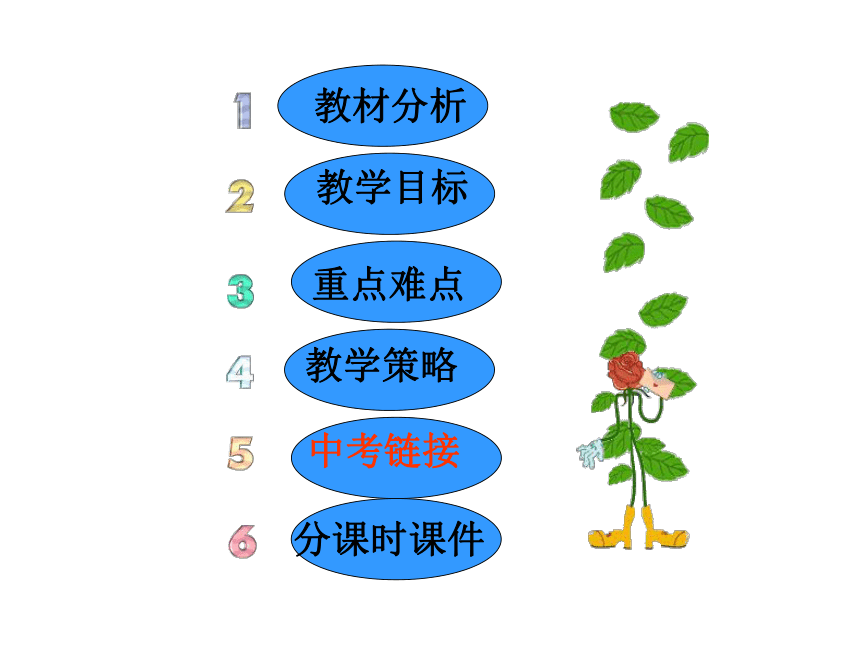
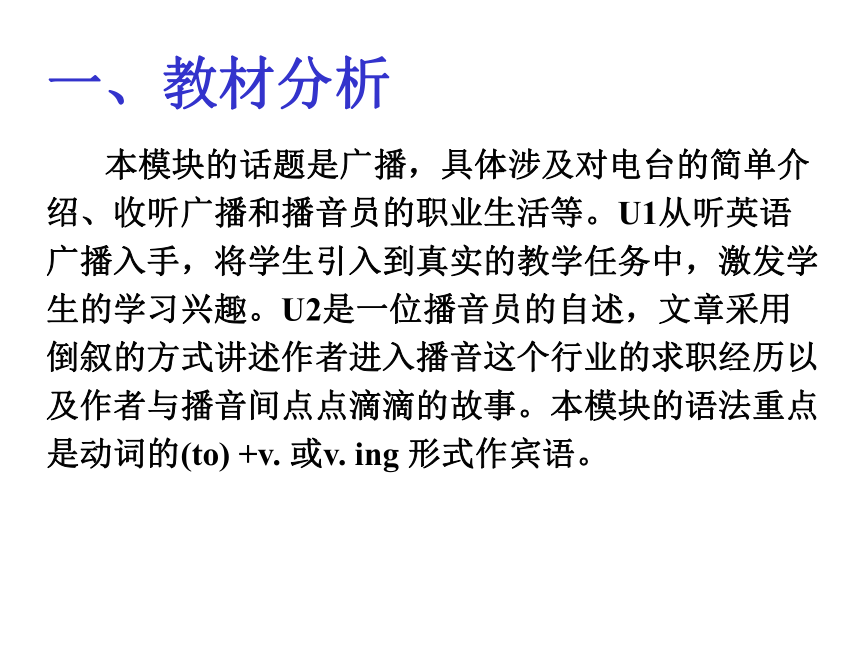
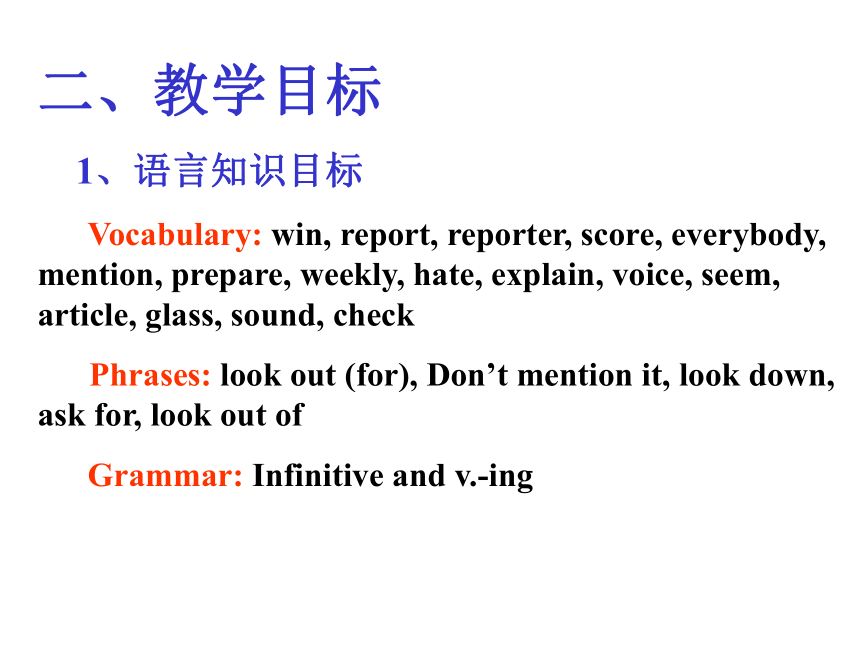
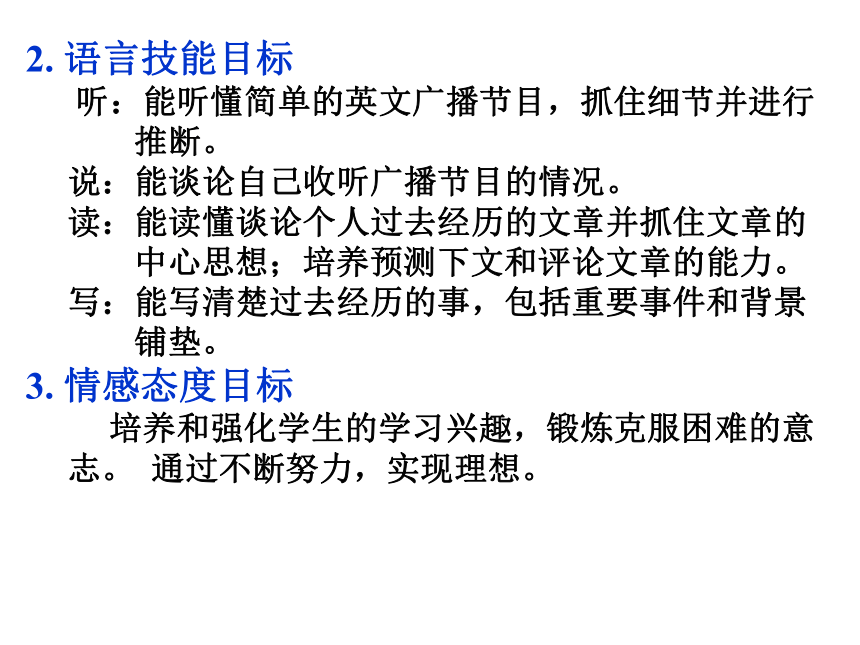
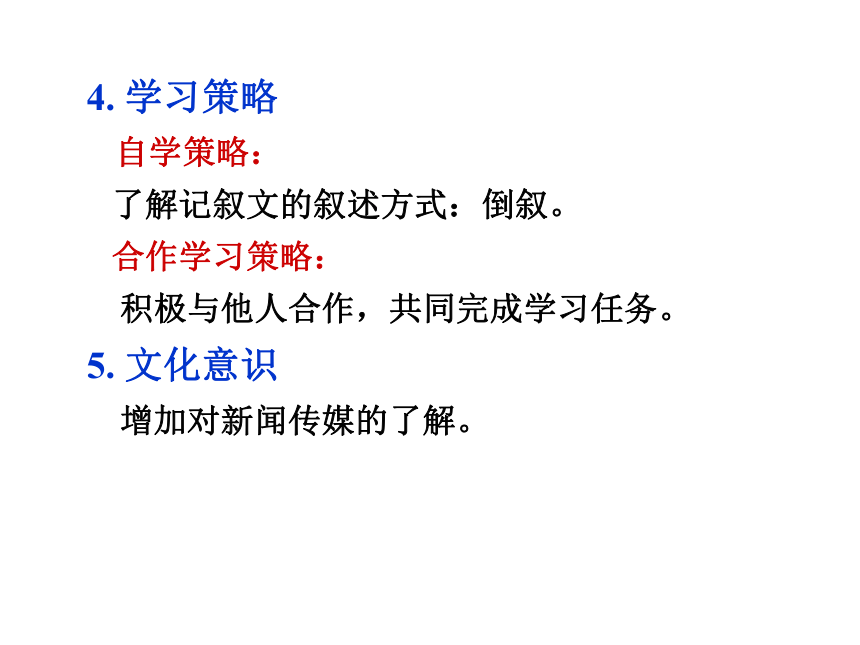
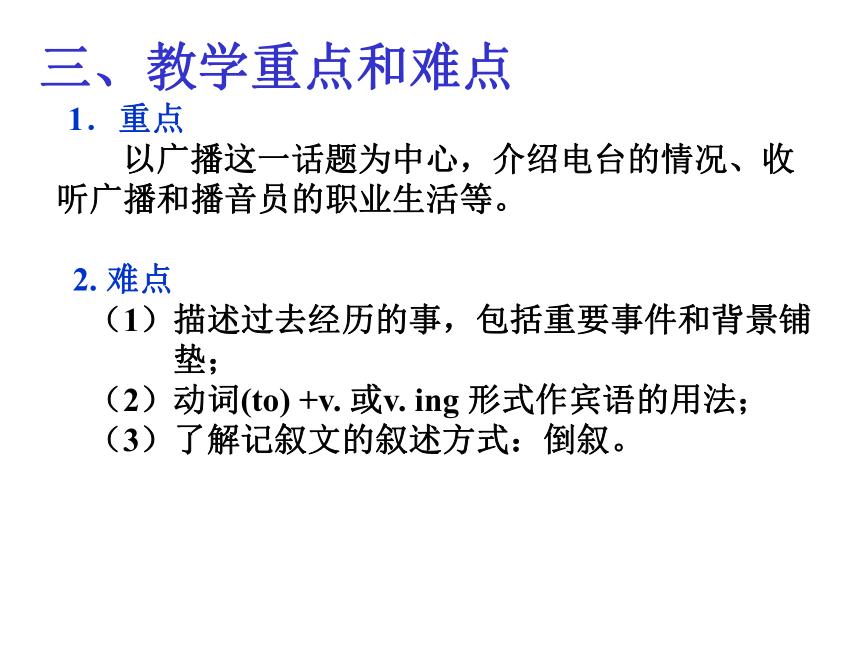
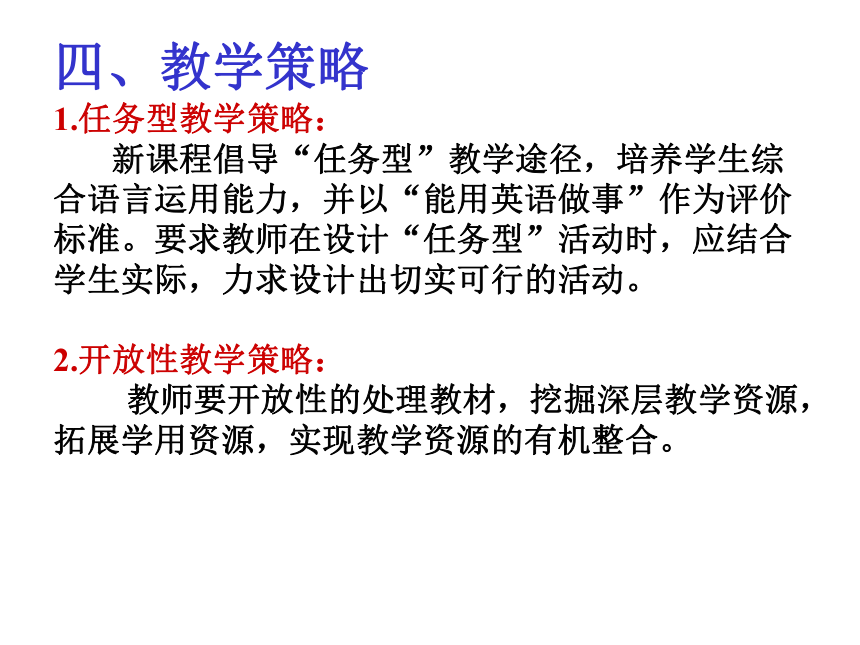
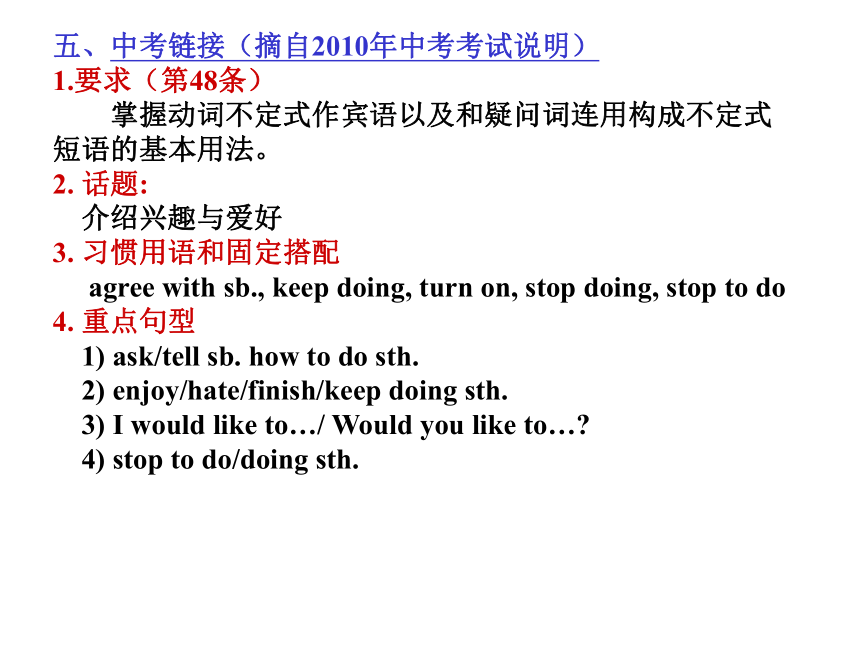
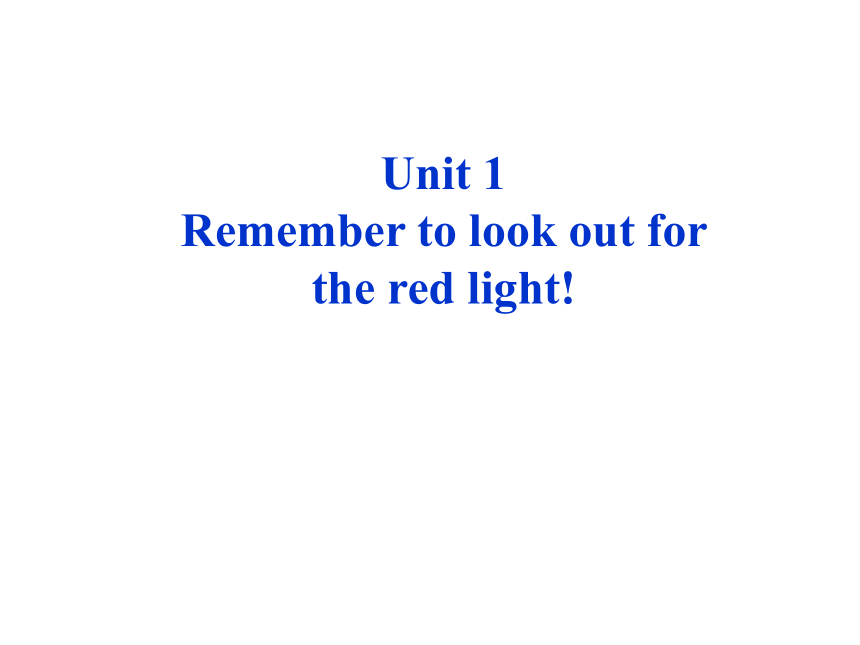
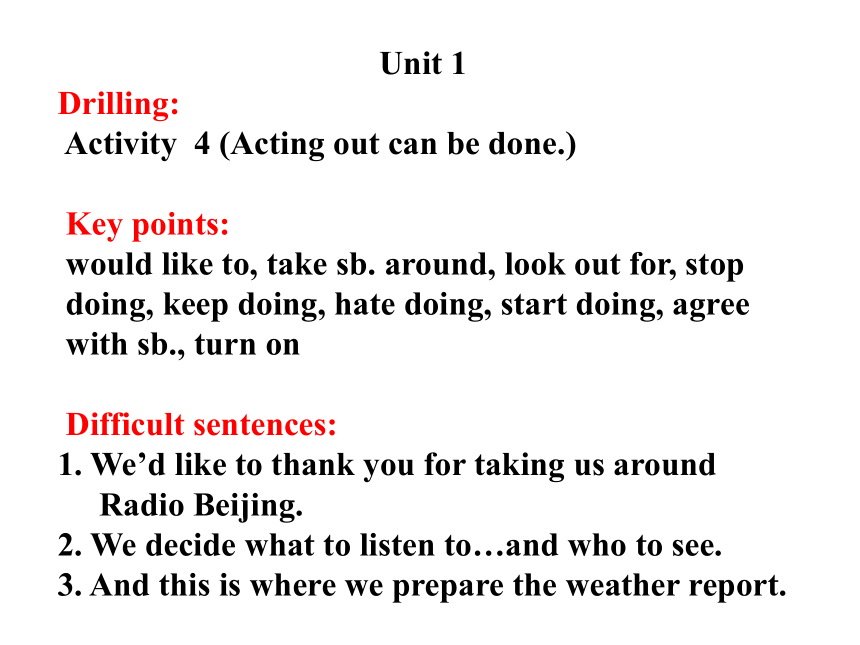
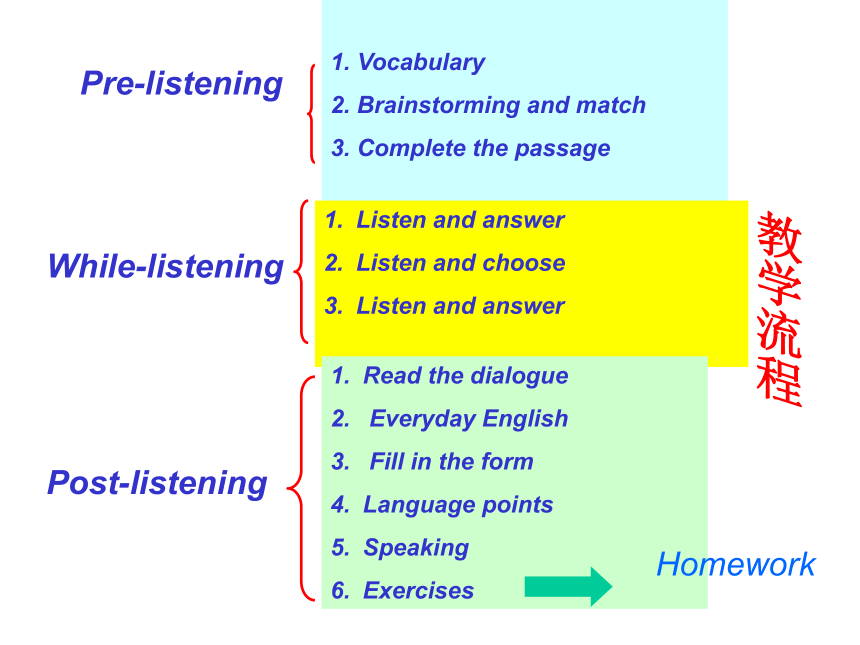
文档简介
(共71张PPT)
Module 3
On the radio
教材分析
教学目标
重点难点
教学策略
中考链接
分课时课件
一、教材分析
本模块的话题是广播,具体涉及对电台的简单介绍、收听广播和播音员的职业生活等。U1从听英语广播入手,将学生引入到真实的教学任务中,激发学生的学习兴趣。U2是一位播音员的自述,文章采用倒叙的方式讲述作者进入播音这个行业的求职经历以及作者与播音间点点滴滴的故事。本模块的语法重点是动词的(to) +v. 或v. ing 形式作宾语。
二、教学目标
1、语言知识目标
Vocabulary: win, report, reporter, score, everybody, mention, prepare, weekly, hate, explain, voice, seem, article, glass, sound, check
Phrases: look out (for), Don’t mention it, look down, ask for, look out of
Grammar: Infinitive and v.-ing
2. 语言技能目标
听:能听懂简单的英文广播节目,抓住细节并进行
推断。
说:能谈论自己收听广播节目的情况。
读:能读懂谈论个人过去经历的文章并抓住文章的
中心思想;培养预测下文和评论文章的能力。
写:能写清楚过去经历的事,包括重要事件和背景
铺垫。
3. 情感态度目标
培养和强化学生的学习兴趣,锻炼克服困难的意
志。 通过不断努力,实现理想。
4. 学习策略
自学策略:
了解记叙文的叙述方式:倒叙。
合作学习策略:
积极与他人合作,共同完成学习任务。
5. 文化意识
增加对新闻传媒的了解。
三、教学重点和难点
1.重点
以广播这一话题为中心,介绍电台的情况、收
听广播和播音员的职业生活等。
2. 难点
(1)描述过去经历的事,包括重要事件和背景铺
垫;
(2)动词(to) +v. 或v. ing 形式作宾语的用法;
(3)了解记叙文的叙述方式:倒叙。
四、教学策略
1.任务型教学策略:
新课程倡导“任务型”教学途径,培养学生综合语言运用能力,并以“能用英语做事”作为评价标准。要求教师在设计“任务型”活动时,应结合学生实际,力求设计出切实可行的活动。
2.开放性教学策略:
教师要开放性的处理教材,挖掘深层教学资源,拓展学用资源,实现教学资源的有机整合。
五、中考链接(摘自2010年中考考试说明)
1.要求(第48条)
掌握动词不定式作宾语以及和疑问词连用构成不定式短语的基本用法。
2. 话题:
介绍兴趣与爱好
3. 习惯用语和固定搭配
agree with sb., keep doing, turn on, stop doing, stop to do
4. 重点句型
1) ask/tell sb. how to do sth.
2) enjoy/hate/finish/keep doing sth.
3) I would like to…/ Would you like to…
4) stop to do/doing sth.
Unit 1
Remember to look out for the red light!
Unit 1
Drilling:
Activity 4 (Acting out can be done.)
Key points:
would like to, take sb. around, look out for, stop
doing, keep doing, hate doing, start doing, agree
with sb., turn on
Difficult sentences:
1. We’d like to thank you for taking us around
Radio Beijing.
2. We decide what to listen to…and who to see.
3. And this is where we prepare the weather report.
Pre-listening
1. Vocabulary
2. Brainstorming and match
3. Complete the passage
While-listening
Listen and answer
Listen and choose
Listen and answer
Post-listening
Read the dialogue
Everyday English
Fill in the form
Language points
Speaking
Exercises
教学流程
Homework
newsreader
reporter
score
goal
look out(for)
win v.
newsreader n.
report n. v.
reporter n.
score n. v.
everybody pron.
mention v.
Don’t mention it.
prepare v.
goal n.
hate n. &v.
小心
赢,获胜
新闻播报员
报道
新闻记者
成绩,分数;得分
每个人
提及
不客气
准备
(进球)得分
憎恨
小心
赢,获胜
新闻播报员
报道
新闻记者
成绩,分数;得分
每个人
提及
不客气
准备
(进球)得分
憎恨
look out (for)
win v.
newsreader n.
report n./v.
reporter n.
score n. v.
everybody pron.
mention v.
Don’t mention it.
prepare v.
goal n.
hate n. &v.
Brain-storming and match the radio programmes with the words in the box.
sunny
newsreader
rain
report
reporter
result
score
latest
win
Complete the passage with the correct
form of the words in the box in Activity1.
The evening news programme usually has two (1)___________, a man and a woman. They read the (2)__________news, and then special (3) __________give more information about the news. The sports reports come next. When the national team(4)_________, the newsreaders look very happy, and if they (5) __________, it looks like very bad news. Finally, the weather report tells it’s going to (6)____________or be(7)_________ tomorrow.
sunny
latest
reports
wins
lose
rain
newsreaders
What’s the latest news
What’s the score of the China-England match
What’s the weather going to be
What are the jobs of Zhang Li and Wang Lin
The Russian president arrived in Beijing for a visit to China.
The score is China 1, England 2.
It’s going to be sunny in the morning and rainy in the afternoon.
Zhang Li is a newsreader. Wang Lin is a sports reporter.
Listen and answer the questions.
Listen and choose the best answer.
What are the children doing
2. What does everyone need to do on Radio Beijing
3. What will the weather be like tomorrow morning
Everyone needs to A. talk to foreigners.
B. watch CCTV 9. C. speak English well.
They are making a new programme.
They are visiting Radio Beijing.
They are learning English.
It will be rainy.
It will be sunny.
It will be windy.
1.How does Chen Huan feel about taking them around
2.Why don’t Daming and Tony agree with each other about the result
3.How do you think the friends feel about visiting Radio Beijing
Listen again and answer the questions.
He is very happy. He enjoys showing them around.
Because they have different ideas. Daming hopes China wins the match,but Tony hopes England wins the match.
They are very interested in it and very happy.They have learned a lot from it.
Don’t mention it.
Come this way.
Keep studying!
Me, too!
Quiet, please!
不客气
这边来
坚持学习
我也是!
请安静(别出声)
followed only
by to followed only by -ing followed by to or
-ing
would like, want, decide
thank you for, enjoy, keep
remember, stop, need, like, hate, start
Can you think of other verbs which have the same use
1.We’d like to thank you for taking us around Radio Beijing.
我们非常感谢你带领我们参观北京电台。
show/take sb. around + 地点 带领某人参观某地
e.g. Daming took the foreigners around Beijing Siheyuan last week.
2.look out for 注意察看,留意
e.g. Look out for spelling mistakes when you check your homework.
检查作业时要注意拼写错误。
3. the latest news 最新消息
4. Maybe one day you can join us.
join / take part in
5. We decide what to listen to…and who to see.
我们决定听什么,要见谁。
特殊疑问词+动词不定式
eg: Can you tell me how to get to the nearest bus station
6.And this is where we prepare the weather report. (表语从句)
这就是我们准备天气预报的地方。
7. We won the match.
win the match /game/race
beat sb. or a team
8. agree with (Act. 4)
9. turn on (Act. 7)
1. What do you like listening to
I like listening to pop music.
2. What do you hate listening to
I hate listening to bad news of our national team.
3. What programme did you listen to the last time you turned on the radio
I listened to the weather report.
Work in pairs. Ask and answer questions about the radio.
5. What must you keep doing to work on radio
I must keep studying.
I / My parents do.
6.Do you or your parents decide what to listen to
and when to listen to the radio
4. What do you need to do if you want to be
a newsreader
I need to speak English well.
Choose the best answer.
My brother enjoys ______ in his free time.
A. draw B. drew C. drawing D. to draw
Would you like ______ to the cinema with me
A. to go B. go C. going D. goes
3. Stop _____ so much noise! Dad is sleeping.
A. to make B. making C. to hear D. hearing
4. I’ll give a talk tomorrow. I’m thinking about__.
A. how can I say B. what can I say
C. how to say D. what to say
Complete the sentences.
谢谢你带我参观博物馆。
__________________________ the museum.
过马路时要注意红绿灯。
____________ the traffic lights when you go across the road.
乔丹赢得了比赛因为他一直坚持练习。
Jordan ____ the match because he __________.
离开教室时记得关窗户。
_______________ the windows when you leave the classroom.
Thank you for taking me around
Look out for
won kept practicing
Remember to close
1.目标 M3 U1
2. Workbook Ex 5
Homework
Unit 2
I remember sitting close to the radio.
Unit 2
Drilling:
Activity 2&4 (Acting out can be done.)
Key points:
look down at, it seems that…, in person, ask for, learn about, close down, look out of, begin with
Difficult sentences:
1. When I was about four or five years old, I remember sitting close to the radio in the living room, listening to my favourite programmes, and to the voices of my favourite presenters.
2. It seemed that they were speaking to me in person.
3. Just tell me what you had for breakfast.
Pre-reading
1.Revision
2. Vocabulary
3. Look and talk
While-reading
Read and choose
Analyse the passage
Read in details—part ¶graph
Read and answer
Post-reading
Language points
Consolidation
Give writing task
Writing preparation
Writing
教学流程
Homework
Choose the best answer.
1. –Would you like ___________ with us That’s a good idea!
A. going B. to go C. go D. went
2. He enjoys ______________ visitors around Beijing Siheyuan.
A. shows B. to show C. to taking D. taking
3. Ssh! The baby is sleeping. Please stop ______________.
A. talking B. to talking C. talk D. to talk
4. On the Radio Beijing everyone needs ______________.
A. to speak English good B. speaking English well
C. to speak English well D. speak English good
5. When you go across the road, remember ______________ the red light.
A. look out for B. to look out C. to look out for D. looking out for
6. Mother said to her son, “Keep ______________, you will be successful!”
A. study B. studying C. to studying D. to study
look down
explain v.
voice n.
seem v.
ask for
listener n.
close down
weekly adj. &n.
article n.
microphone n.
glass n.
sound n. &v.
check n. &v.
向下看
解释,说明
声音
看起来,似乎
要……
收听者,听众
停止播音;关闭
每周的;周刊
(报纸上的)文章
麦克风
玻璃;玻璃杯
声音;听起来
检查
look down
explain v.
voice n.
seem v.
ask for
listener n.
close down
weekly adj. &n.
article n.
microphone n.
glass n.
sound n. &v.
check n. &v.
向下看
解释,说明
声音
看起来,似乎
要……
收听者,听众
停止播音;关闭
每周的;周刊
(报纸上的)文章
麦克风
玻璃;玻璃杯
声音;听起来
检查
1.He is a newsreader.
2.He is in the studio.
3.He is reading the news.
Some people are sitting behind the glass wall.
1.What is the boy
2.Where is he
3.what’s he doing
a) In a book about the history of radio.
b) In the life story of a famous radio presenter.
c) In a book on how radio works.
Decide where are you likely to read the passage.
Learning to learn
It’s sometimes difficult to understand the order in which events happened. In this passage, it starts off in the past, during the writer’s early career. Then it goes to an earlier past, when he was a child. Make sure you understand the order of events in a story.
“And you want a job in radio Shouldn’t you be at school ” he asked.
( ) What did the manager think when he knew the
writer was only 15 years old
A. sad B. happy C. surprised
Part Ⅰ (Paragraph 1, 2 &3)
At the age of nine, I asked for jobs in small radio stations.
( ) How old was he when he asked for jobs in
small radio stations
A. Nine. B. Five. C. Four.
Part Ⅱ (Para 4, 5 &6)
Once a week, I played my favourite music from my father’s computer to the listeners,…
( ) How often did the writer play his favourite music from his father’s computer to the listeners
A. Once a week. B. Once a month. C. Everyday.
Part Ⅱ (Para 4, 5 &6)
We prepared the weekly programmes, articles about music, sports news, jokes and the weather report.
What did the writer and his friends prepare
Part Ⅱ (Para 4, 5 &6)
The weekly programmes, articles about music, sports news, jokes and the weather report.
“I had eggs, fruit and some milk.”
( ) What did the writer have for breakfast
A. Eggs and some milk.
B. Fruit.
C. Both A &B.
Part Ⅲ (the last paragraphs )
Who wrote it
What’s the story about
Why did he write it
A newsreader./a person working in radio for some time.
It’s about an interview at a radio station.
Because he wanted to tell people how he got interested in radio work.
Read the passage and answer the questions.
Why does the writer ask “How could I explain”
Did the writer write all the articles on his home page in person or did someone help him
How did the writer prepare programmes about the weather
Answer the questions about the words and expressions in the box.
article explain in person prepare
Because it’s hard for him to explain his love for radio.
Some of his friends helped him.
By looking out of the window to see what it was like.
1.Look down at sb. 上下打量某人
2. When I was about four or five years old, I remember sitting close to the radio in the living room, listening to my favourite programmes, and to the voices of my favourite presenters. (做状语,表伴随)
3.It seemed that they were speaking to me in person.
①in person 亲身,亲自
e.g. I’ll go to the meeting in person. 我将亲自赴会。
②It seems that+句子 看起来似乎……
e.g. It seems that there will be heavy rain soon.
4. ask for 要
5.As I grew older, my interest in radio grew.(状语从句)随着年龄的增长,我对广播事业的兴趣与日俱增。
6. …and then closed down and did my homework…然后关机,再做作业
close down 停止
e.g. Most television stations close down at 12:00pm.
大多数电视台在午夜12点停止播出。
7. I did this by looking out of the window.
look out of 向…外看
8. have sth. for+三餐 早/午/晚饭吃的什么
e.g. I had 2 eggs and some milk for breakfast yesterday.
9.All radio presenters begin work with the same question.
begin with… 以……开始
e.g. The party began with the classical music.
10. And this was how my first real job in radio began.
(表语从句)
这就是我在广播事业中第一个工作的开始。
I’ve always loved_________. When I was _______ years old, I was sitting ______________, listening to my ________________
and the voices of my___________________. At the age of nine, I _______________in small radio stations. As I grew older, my interest in radio _______. I learned about______________. Once a week, I played my favourite music to the listeners and ______________ life at school. Soon my friends at junior high school _____________________, and then they wanted to _________. At the age of __________ , I asked for a job at the radio studio at WXBN. The manager let me _______________. He asked me to say _________________________________.
In the end, he agreed me to work there. This was how my first real job in radio _______.
Retell the passage--fill in the blanks with proper words or phrases in the passage.
the radio
4 or 5
close to the radio
favourite programmes
favourite presenters
asked for jobs
grew
Internet radio
talked about
started to listen
help
fifteen
do a sound check
What I had for breakfast
began
Think of something you love doing, and imagine you have had a job doing it. Write a passage describing an important event in the past, and some background information.
Let’s go back to the passage.
Part ⅠⅢ: an important event in the past
Part Ⅱ : background information
Something you love
An important event
Background information
Try to use the form to help you finish your passage.
English
Enter an English speech competition and become the winner.
At 6, begin to learn English
At 8, listen to English programmes
At 9, watch CCTV 9
At 10, talk to foreigners
Homework:
目标U2
Finish your passage.
Unit 3
Language in use
Unit 3
Focus: infinitive & v.-ing
Drilling: Activity 2 & 5
Key points:
P 22: have to
P 23: find out, as well as
P 24: Two and a half hours
Difficult sentences:
P 23:
Activity 3
用括号内所给动词的正确形式填空。
I’d like _________(invite) you to my house.
Remember ____________(close) the window before you go out.
I remember ___________(meet) her at a party last night. She was my classmate’s friend.
Every student needs ___________(study) hard.
His father enjoys ___________(watch) English films.
It’s time for class. Stop __________(talk).
Don’t lose(灰心). Keep ________(study). You will make great progress(进步).
It’ll start ________________(rain) in the afternoon.
to invite
to close
meeting
to study
watching
talking
studying
to rain / raining
Choose the word which does not belong in each group.
article report newspaper reporter
sunny rain glass weather
score result match studio
presenter manager newsreader reporter
sport news job sunny
Complete the sentences with the correct form of the words and expressions in the box.
latest prepare rain result score sports
sunny weather weather report win
Did you listen to the ________________ What will the_______be like tomorrow
It’s going to be _______. It isn’t going to_______.
We can have a picnic! I’ll _______the food today.
It’s six o’clock. Let’s listen to the _______news to find out the _______of the football match.
Hey,our team _______three goals. They _______the match. That’s fantastic!
Do you like other _______as well as football
weather report
latest
sunny
rain
prepare
weather
result
scored
won
sports
Complete the passage with the phrases in the box.
I’m going to(1) ______________ the radio station. You must(2) ______________light. When it’s on, you have to be quiet. I know some of you (3)____________ work in radio. I’ll introduce you to the presenters an you can talk to them. This screen shows us what’s happening outside. We can’t(4) _____________the window, because there aren’t any windows. The first programme of the day starts at 5 am, and the station(5) ___________at 12pm. OK, that’s (6) ________the tour. Has anyone got a question
closes down look out for look out of
take you around the end of would like to
take you around
look out for
would like to
look out of
closes down
the end of
agree continue decide enjoy hate learn keep
like love need remember start stop try want
followed only
by to followed only by -ing followed by to or -ing
agree, decide, learn, need, want
enjoy, keep
continue, hate, like, love, remember, start, stop, try
Put the words in the correct column.
I want our team ________(win).I like ________ (win)
Tony hates _______(see)his team lose.
2. Daming enjoys ________(listen)to music.
3. They decided ________(visit)Radio Beijing with Sally.
4. They have to stop ________(talk)when the red light is on.
5. Keep ________(study)English if you want to work on Radio Beijing.
6. You need ________(speak)English to work in radio.
7. He started ________________ (make)his own radio programme.
8. He remembers ________(get)his first job in radio.
9. He learnt ________(speak)on the radio.
to win
wining
seeing
listening
to visit
talking
studying
to speak
making/to make
getting
to speak
Complete the sentences with the correct form of the words.
Complete the sentences with to or –ing.
Are you listening to the radio I’d like to ________(hear)the news.
Is that the weather report I need ________(know)if it’s going to rain.
Sally told Chen Huan she was ________(make)new friends.
I’ll try ________(record)the programme.
That’s the end of the programme. Thank you for ________(listen)
Tony likes listening to music, but he hates ________(practise)the piano.
hear
to know
practising
listening
to record
making
what/ kind /radio programmes/ you/ enjoy listening to/
What kind of radio programmes do you enjoy listening to
1. what/ you/ enjoy/ do/ when/ be/ alone/
2. When/ you/ start/ learn/ English/
3. you /think/ you/ need/ work/ harder/ school/
4. what/ school subject/ you like/ study/ most/
5. What/ you/ want/ do/ when/ leave/ school/
When did you start learning English
What do you enjoy doing when you’re alone
Do you think you need to work harder at school
What school subject do you like studying most
What do you want to do when you leave school
Write the questions.
Match the beginnings with the endings. Make as many sentences as possible.
1. Everybody knows
2. We will find out
3. Please tell me
4. The listeners tell us
5. They were happy to know
6. He asked
7. Did they know
8. Have you heard
a. when she came into this room.
b. what they want to hear.
c. how long the Great Wall is.
d. that they won the first prize last
week
e. why they must be quiet.
f. that he will come
g. who the most popular singer is.
h. what he was doing at that time
Listen and say what Kate’s job is.
A newspaper reporter.
A radio presenter.
A newsreader.
Listen again and choose the best answer.
How does Kate find out about the news
a) While she’s at the park.
b) While she’s running to the park.
c) While she’s on the running machine at the gym.
Who decides what will be on Kate’s show
a) Kate.
b) Kate’s team.
c) Kate and her team.
3. How long is Kate’s programme
a) Two and a half hours.
b) Four and a half hours.
c) Three and a half hours.
4. How does Kate try to give the show a personal feeling
a) She talks to the listeners in person.
b) She imagines that she is talking to the listeners in person.
c) She interviews the listeners.
5. Which of the following are in Kate’s programme
a) phone-ins b) weather reports
c) interviews d) sport e) news
Around the w rld
British inventor, Trevor Baylis, was listening to a radio programme one day about health problems in Africa. He then realised how much a radio would help African people learn about health and health care. Electricity and batteries are expensive and hard to get in some parts of Africa, so he developed a clever radio that works without batteries or electricity. The clockwork or wind-up radio, first make in South African people. Even in tiny villages which had no electricity, or forms of communication, people began to listen to the radio, not only for entertainment, but educate themselves, too.
Answer the questions
1.What is Trevor Baylis
2.What does a radio help African people learn about
3.What did Trevor Baylis develop?
4.Did the clockwork radio change the lives of many African people
5.Why did African people begin to listen to the radio
A British inventor.
Health and health care.
The Clockwork Radio.
Yes, it did.
Not only for entertainment ,but to educate themselves, too.
Making a school radio programme
Sections Who Content
News
Sports and sports news
Music
Stories
Reviews
Interviews
Phone-ins
Weather reports
目标M3 U3
Make a school radio programme in groups
Thanks for listening!
Module 3
On the radio
教材分析
教学目标
重点难点
教学策略
中考链接
分课时课件
一、教材分析
本模块的话题是广播,具体涉及对电台的简单介绍、收听广播和播音员的职业生活等。U1从听英语广播入手,将学生引入到真实的教学任务中,激发学生的学习兴趣。U2是一位播音员的自述,文章采用倒叙的方式讲述作者进入播音这个行业的求职经历以及作者与播音间点点滴滴的故事。本模块的语法重点是动词的(to) +v. 或v. ing 形式作宾语。
二、教学目标
1、语言知识目标
Vocabulary: win, report, reporter, score, everybody, mention, prepare, weekly, hate, explain, voice, seem, article, glass, sound, check
Phrases: look out (for), Don’t mention it, look down, ask for, look out of
Grammar: Infinitive and v.-ing
2. 语言技能目标
听:能听懂简单的英文广播节目,抓住细节并进行
推断。
说:能谈论自己收听广播节目的情况。
读:能读懂谈论个人过去经历的文章并抓住文章的
中心思想;培养预测下文和评论文章的能力。
写:能写清楚过去经历的事,包括重要事件和背景
铺垫。
3. 情感态度目标
培养和强化学生的学习兴趣,锻炼克服困难的意
志。 通过不断努力,实现理想。
4. 学习策略
自学策略:
了解记叙文的叙述方式:倒叙。
合作学习策略:
积极与他人合作,共同完成学习任务。
5. 文化意识
增加对新闻传媒的了解。
三、教学重点和难点
1.重点
以广播这一话题为中心,介绍电台的情况、收
听广播和播音员的职业生活等。
2. 难点
(1)描述过去经历的事,包括重要事件和背景铺
垫;
(2)动词(to) +v. 或v. ing 形式作宾语的用法;
(3)了解记叙文的叙述方式:倒叙。
四、教学策略
1.任务型教学策略:
新课程倡导“任务型”教学途径,培养学生综合语言运用能力,并以“能用英语做事”作为评价标准。要求教师在设计“任务型”活动时,应结合学生实际,力求设计出切实可行的活动。
2.开放性教学策略:
教师要开放性的处理教材,挖掘深层教学资源,拓展学用资源,实现教学资源的有机整合。
五、中考链接(摘自2010年中考考试说明)
1.要求(第48条)
掌握动词不定式作宾语以及和疑问词连用构成不定式短语的基本用法。
2. 话题:
介绍兴趣与爱好
3. 习惯用语和固定搭配
agree with sb., keep doing, turn on, stop doing, stop to do
4. 重点句型
1) ask/tell sb. how to do sth.
2) enjoy/hate/finish/keep doing sth.
3) I would like to…/ Would you like to…
4) stop to do/doing sth.
Unit 1
Remember to look out for the red light!
Unit 1
Drilling:
Activity 4 (Acting out can be done.)
Key points:
would like to, take sb. around, look out for, stop
doing, keep doing, hate doing, start doing, agree
with sb., turn on
Difficult sentences:
1. We’d like to thank you for taking us around
Radio Beijing.
2. We decide what to listen to…and who to see.
3. And this is where we prepare the weather report.
Pre-listening
1. Vocabulary
2. Brainstorming and match
3. Complete the passage
While-listening
Listen and answer
Listen and choose
Listen and answer
Post-listening
Read the dialogue
Everyday English
Fill in the form
Language points
Speaking
Exercises
教学流程
Homework
newsreader
reporter
score
goal
look out(for)
win v.
newsreader n.
report n. v.
reporter n.
score n. v.
everybody pron.
mention v.
Don’t mention it.
prepare v.
goal n.
hate n. &v.
小心
赢,获胜
新闻播报员
报道
新闻记者
成绩,分数;得分
每个人
提及
不客气
准备
(进球)得分
憎恨
小心
赢,获胜
新闻播报员
报道
新闻记者
成绩,分数;得分
每个人
提及
不客气
准备
(进球)得分
憎恨
look out (for)
win v.
newsreader n.
report n./v.
reporter n.
score n. v.
everybody pron.
mention v.
Don’t mention it.
prepare v.
goal n.
hate n. &v.
Brain-storming and match the radio programmes with the words in the box.
sunny
newsreader
rain
report
reporter
result
score
latest
win
Complete the passage with the correct
form of the words in the box in Activity1.
The evening news programme usually has two (1)___________, a man and a woman. They read the (2)__________news, and then special (3) __________give more information about the news. The sports reports come next. When the national team(4)_________, the newsreaders look very happy, and if they (5) __________, it looks like very bad news. Finally, the weather report tells it’s going to (6)____________or be(7)_________ tomorrow.
sunny
latest
reports
wins
lose
rain
newsreaders
What’s the latest news
What’s the score of the China-England match
What’s the weather going to be
What are the jobs of Zhang Li and Wang Lin
The Russian president arrived in Beijing for a visit to China.
The score is China 1, England 2.
It’s going to be sunny in the morning and rainy in the afternoon.
Zhang Li is a newsreader. Wang Lin is a sports reporter.
Listen and answer the questions.
Listen and choose the best answer.
What are the children doing
2. What does everyone need to do on Radio Beijing
3. What will the weather be like tomorrow morning
Everyone needs to A. talk to foreigners.
B. watch CCTV 9. C. speak English well.
They are making a new programme.
They are visiting Radio Beijing.
They are learning English.
It will be rainy.
It will be sunny.
It will be windy.
1.How does Chen Huan feel about taking them around
2.Why don’t Daming and Tony agree with each other about the result
3.How do you think the friends feel about visiting Radio Beijing
Listen again and answer the questions.
He is very happy. He enjoys showing them around.
Because they have different ideas. Daming hopes China wins the match,but Tony hopes England wins the match.
They are very interested in it and very happy.They have learned a lot from it.
Don’t mention it.
Come this way.
Keep studying!
Me, too!
Quiet, please!
不客气
这边来
坚持学习
我也是!
请安静(别出声)
followed only
by to followed only by -ing followed by to or
-ing
would like, want, decide
thank you for, enjoy, keep
remember, stop, need, like, hate, start
Can you think of other verbs which have the same use
1.We’d like to thank you for taking us around Radio Beijing.
我们非常感谢你带领我们参观北京电台。
show/take sb. around + 地点 带领某人参观某地
e.g. Daming took the foreigners around Beijing Siheyuan last week.
2.look out for 注意察看,留意
e.g. Look out for spelling mistakes when you check your homework.
检查作业时要注意拼写错误。
3. the latest news 最新消息
4. Maybe one day you can join us.
join / take part in
5. We decide what to listen to…and who to see.
我们决定听什么,要见谁。
特殊疑问词+动词不定式
eg: Can you tell me how to get to the nearest bus station
6.And this is where we prepare the weather report. (表语从句)
这就是我们准备天气预报的地方。
7. We won the match.
win the match /game/race
beat sb. or a team
8. agree with (Act. 4)
9. turn on (Act. 7)
1. What do you like listening to
I like listening to pop music.
2. What do you hate listening to
I hate listening to bad news of our national team.
3. What programme did you listen to the last time you turned on the radio
I listened to the weather report.
Work in pairs. Ask and answer questions about the radio.
5. What must you keep doing to work on radio
I must keep studying.
I / My parents do.
6.Do you or your parents decide what to listen to
and when to listen to the radio
4. What do you need to do if you want to be
a newsreader
I need to speak English well.
Choose the best answer.
My brother enjoys ______ in his free time.
A. draw B. drew C. drawing D. to draw
Would you like ______ to the cinema with me
A. to go B. go C. going D. goes
3. Stop _____ so much noise! Dad is sleeping.
A. to make B. making C. to hear D. hearing
4. I’ll give a talk tomorrow. I’m thinking about__.
A. how can I say B. what can I say
C. how to say D. what to say
Complete the sentences.
谢谢你带我参观博物馆。
__________________________ the museum.
过马路时要注意红绿灯。
____________ the traffic lights when you go across the road.
乔丹赢得了比赛因为他一直坚持练习。
Jordan ____ the match because he __________.
离开教室时记得关窗户。
_______________ the windows when you leave the classroom.
Thank you for taking me around
Look out for
won kept practicing
Remember to close
1.目标 M3 U1
2. Workbook Ex 5
Homework
Unit 2
I remember sitting close to the radio.
Unit 2
Drilling:
Activity 2&4 (Acting out can be done.)
Key points:
look down at, it seems that…, in person, ask for, learn about, close down, look out of, begin with
Difficult sentences:
1. When I was about four or five years old, I remember sitting close to the radio in the living room, listening to my favourite programmes, and to the voices of my favourite presenters.
2. It seemed that they were speaking to me in person.
3. Just tell me what you had for breakfast.
Pre-reading
1.Revision
2. Vocabulary
3. Look and talk
While-reading
Read and choose
Analyse the passage
Read in details—part ¶graph
Read and answer
Post-reading
Language points
Consolidation
Give writing task
Writing preparation
Writing
教学流程
Homework
Choose the best answer.
1. –Would you like ___________ with us That’s a good idea!
A. going B. to go C. go D. went
2. He enjoys ______________ visitors around Beijing Siheyuan.
A. shows B. to show C. to taking D. taking
3. Ssh! The baby is sleeping. Please stop ______________.
A. talking B. to talking C. talk D. to talk
4. On the Radio Beijing everyone needs ______________.
A. to speak English good B. speaking English well
C. to speak English well D. speak English good
5. When you go across the road, remember ______________ the red light.
A. look out for B. to look out C. to look out for D. looking out for
6. Mother said to her son, “Keep ______________, you will be successful!”
A. study B. studying C. to studying D. to study
look down
explain v.
voice n.
seem v.
ask for
listener n.
close down
weekly adj. &n.
article n.
microphone n.
glass n.
sound n. &v.
check n. &v.
向下看
解释,说明
声音
看起来,似乎
要……
收听者,听众
停止播音;关闭
每周的;周刊
(报纸上的)文章
麦克风
玻璃;玻璃杯
声音;听起来
检查
look down
explain v.
voice n.
seem v.
ask for
listener n.
close down
weekly adj. &n.
article n.
microphone n.
glass n.
sound n. &v.
check n. &v.
向下看
解释,说明
声音
看起来,似乎
要……
收听者,听众
停止播音;关闭
每周的;周刊
(报纸上的)文章
麦克风
玻璃;玻璃杯
声音;听起来
检查
1.He is a newsreader.
2.He is in the studio.
3.He is reading the news.
Some people are sitting behind the glass wall.
1.What is the boy
2.Where is he
3.what’s he doing
a) In a book about the history of radio.
b) In the life story of a famous radio presenter.
c) In a book on how radio works.
Decide where are you likely to read the passage.
Learning to learn
It’s sometimes difficult to understand the order in which events happened. In this passage, it starts off in the past, during the writer’s early career. Then it goes to an earlier past, when he was a child. Make sure you understand the order of events in a story.
“And you want a job in radio Shouldn’t you be at school ” he asked.
( ) What did the manager think when he knew the
writer was only 15 years old
A. sad B. happy C. surprised
Part Ⅰ (Paragraph 1, 2 &3)
At the age of nine, I asked for jobs in small radio stations.
( ) How old was he when he asked for jobs in
small radio stations
A. Nine. B. Five. C. Four.
Part Ⅱ (Para 4, 5 &6)
Once a week, I played my favourite music from my father’s computer to the listeners,…
( ) How often did the writer play his favourite music from his father’s computer to the listeners
A. Once a week. B. Once a month. C. Everyday.
Part Ⅱ (Para 4, 5 &6)
We prepared the weekly programmes, articles about music, sports news, jokes and the weather report.
What did the writer and his friends prepare
Part Ⅱ (Para 4, 5 &6)
The weekly programmes, articles about music, sports news, jokes and the weather report.
“I had eggs, fruit and some milk.”
( ) What did the writer have for breakfast
A. Eggs and some milk.
B. Fruit.
C. Both A &B.
Part Ⅲ (the last paragraphs )
Who wrote it
What’s the story about
Why did he write it
A newsreader./a person working in radio for some time.
It’s about an interview at a radio station.
Because he wanted to tell people how he got interested in radio work.
Read the passage and answer the questions.
Why does the writer ask “How could I explain”
Did the writer write all the articles on his home page in person or did someone help him
How did the writer prepare programmes about the weather
Answer the questions about the words and expressions in the box.
article explain in person prepare
Because it’s hard for him to explain his love for radio.
Some of his friends helped him.
By looking out of the window to see what it was like.
1.Look down at sb. 上下打量某人
2. When I was about four or five years old, I remember sitting close to the radio in the living room, listening to my favourite programmes, and to the voices of my favourite presenters. (做状语,表伴随)
3.It seemed that they were speaking to me in person.
①in person 亲身,亲自
e.g. I’ll go to the meeting in person. 我将亲自赴会。
②It seems that+句子 看起来似乎……
e.g. It seems that there will be heavy rain soon.
4. ask for 要
5.As I grew older, my interest in radio grew.(状语从句)随着年龄的增长,我对广播事业的兴趣与日俱增。
6. …and then closed down and did my homework…然后关机,再做作业
close down 停止
e.g. Most television stations close down at 12:00pm.
大多数电视台在午夜12点停止播出。
7. I did this by looking out of the window.
look out of 向…外看
8. have sth. for+三餐 早/午/晚饭吃的什么
e.g. I had 2 eggs and some milk for breakfast yesterday.
9.All radio presenters begin work with the same question.
begin with… 以……开始
e.g. The party began with the classical music.
10. And this was how my first real job in radio began.
(表语从句)
这就是我在广播事业中第一个工作的开始。
I’ve always loved_________. When I was _______ years old, I was sitting ______________, listening to my ________________
and the voices of my___________________. At the age of nine, I _______________in small radio stations. As I grew older, my interest in radio _______. I learned about______________. Once a week, I played my favourite music to the listeners and ______________ life at school. Soon my friends at junior high school _____________________, and then they wanted to _________. At the age of __________ , I asked for a job at the radio studio at WXBN. The manager let me _______________. He asked me to say _________________________________.
In the end, he agreed me to work there. This was how my first real job in radio _______.
Retell the passage--fill in the blanks with proper words or phrases in the passage.
the radio
4 or 5
close to the radio
favourite programmes
favourite presenters
asked for jobs
grew
Internet radio
talked about
started to listen
help
fifteen
do a sound check
What I had for breakfast
began
Think of something you love doing, and imagine you have had a job doing it. Write a passage describing an important event in the past, and some background information.
Let’s go back to the passage.
Part ⅠⅢ: an important event in the past
Part Ⅱ : background information
Something you love
An important event
Background information
Try to use the form to help you finish your passage.
English
Enter an English speech competition and become the winner.
At 6, begin to learn English
At 8, listen to English programmes
At 9, watch CCTV 9
At 10, talk to foreigners
Homework:
目标U2
Finish your passage.
Unit 3
Language in use
Unit 3
Focus: infinitive & v.-ing
Drilling: Activity 2 & 5
Key points:
P 22: have to
P 23: find out, as well as
P 24: Two and a half hours
Difficult sentences:
P 23:
Activity 3
用括号内所给动词的正确形式填空。
I’d like _________(invite) you to my house.
Remember ____________(close) the window before you go out.
I remember ___________(meet) her at a party last night. She was my classmate’s friend.
Every student needs ___________(study) hard.
His father enjoys ___________(watch) English films.
It’s time for class. Stop __________(talk).
Don’t lose(灰心). Keep ________(study). You will make great progress(进步).
It’ll start ________________(rain) in the afternoon.
to invite
to close
meeting
to study
watching
talking
studying
to rain / raining
Choose the word which does not belong in each group.
article report newspaper reporter
sunny rain glass weather
score result match studio
presenter manager newsreader reporter
sport news job sunny
Complete the sentences with the correct form of the words and expressions in the box.
latest prepare rain result score sports
sunny weather weather report win
Did you listen to the ________________ What will the_______be like tomorrow
It’s going to be _______. It isn’t going to_______.
We can have a picnic! I’ll _______the food today.
It’s six o’clock. Let’s listen to the _______news to find out the _______of the football match.
Hey,our team _______three goals. They _______the match. That’s fantastic!
Do you like other _______as well as football
weather report
latest
sunny
rain
prepare
weather
result
scored
won
sports
Complete the passage with the phrases in the box.
I’m going to(1) ______________ the radio station. You must(2) ______________light. When it’s on, you have to be quiet. I know some of you (3)____________ work in radio. I’ll introduce you to the presenters an you can talk to them. This screen shows us what’s happening outside. We can’t(4) _____________the window, because there aren’t any windows. The first programme of the day starts at 5 am, and the station(5) ___________at 12pm. OK, that’s (6) ________the tour. Has anyone got a question
closes down look out for look out of
take you around the end of would like to
take you around
look out for
would like to
look out of
closes down
the end of
agree continue decide enjoy hate learn keep
like love need remember start stop try want
followed only
by to followed only by -ing followed by to or -ing
agree, decide, learn, need, want
enjoy, keep
continue, hate, like, love, remember, start, stop, try
Put the words in the correct column.
I want our team ________(win).I like ________ (win)
Tony hates _______(see)his team lose.
2. Daming enjoys ________(listen)to music.
3. They decided ________(visit)Radio Beijing with Sally.
4. They have to stop ________(talk)when the red light is on.
5. Keep ________(study)English if you want to work on Radio Beijing.
6. You need ________(speak)English to work in radio.
7. He started ________________ (make)his own radio programme.
8. He remembers ________(get)his first job in radio.
9. He learnt ________(speak)on the radio.
to win
wining
seeing
listening
to visit
talking
studying
to speak
making/to make
getting
to speak
Complete the sentences with the correct form of the words.
Complete the sentences with to or –ing.
Are you listening to the radio I’d like to ________(hear)the news.
Is that the weather report I need ________(know)if it’s going to rain.
Sally told Chen Huan she was ________(make)new friends.
I’ll try ________(record)the programme.
That’s the end of the programme. Thank you for ________(listen)
Tony likes listening to music, but he hates ________(practise)the piano.
hear
to know
practising
listening
to record
making
what/ kind /radio programmes/ you/ enjoy listening to/
What kind of radio programmes do you enjoy listening to
1. what/ you/ enjoy/ do/ when/ be/ alone/
2. When/ you/ start/ learn/ English/
3. you /think/ you/ need/ work/ harder/ school/
4. what/ school subject/ you like/ study/ most/
5. What/ you/ want/ do/ when/ leave/ school/
When did you start learning English
What do you enjoy doing when you’re alone
Do you think you need to work harder at school
What school subject do you like studying most
What do you want to do when you leave school
Write the questions.
Match the beginnings with the endings. Make as many sentences as possible.
1. Everybody knows
2. We will find out
3. Please tell me
4. The listeners tell us
5. They were happy to know
6. He asked
7. Did they know
8. Have you heard
a. when she came into this room.
b. what they want to hear.
c. how long the Great Wall is.
d. that they won the first prize last
week
e. why they must be quiet.
f. that he will come
g. who the most popular singer is.
h. what he was doing at that time
Listen and say what Kate’s job is.
A newspaper reporter.
A radio presenter.
A newsreader.
Listen again and choose the best answer.
How does Kate find out about the news
a) While she’s at the park.
b) While she’s running to the park.
c) While she’s on the running machine at the gym.
Who decides what will be on Kate’s show
a) Kate.
b) Kate’s team.
c) Kate and her team.
3. How long is Kate’s programme
a) Two and a half hours.
b) Four and a half hours.
c) Three and a half hours.
4. How does Kate try to give the show a personal feeling
a) She talks to the listeners in person.
b) She imagines that she is talking to the listeners in person.
c) She interviews the listeners.
5. Which of the following are in Kate’s programme
a) phone-ins b) weather reports
c) interviews d) sport e) news
Around the w rld
British inventor, Trevor Baylis, was listening to a radio programme one day about health problems in Africa. He then realised how much a radio would help African people learn about health and health care. Electricity and batteries are expensive and hard to get in some parts of Africa, so he developed a clever radio that works without batteries or electricity. The clockwork or wind-up radio, first make in South African people. Even in tiny villages which had no electricity, or forms of communication, people began to listen to the radio, not only for entertainment, but educate themselves, too.
Answer the questions
1.What is Trevor Baylis
2.What does a radio help African people learn about
3.What did Trevor Baylis develop?
4.Did the clockwork radio change the lives of many African people
5.Why did African people begin to listen to the radio
A British inventor.
Health and health care.
The Clockwork Radio.
Yes, it did.
Not only for entertainment ,but to educate themselves, too.
Making a school radio programme
Sections Who Content
News
Sports and sports news
Music
Stories
Reviews
Interviews
Phone-ins
Weather reports
目标M3 U3
Make a school radio programme in groups
Thanks for listening!
同课章节目录
- Module 1 Feelings and impressions
- Unit 1 It smells delicious.
- Unit 2 I feel nervous when I speak Chinese .
- Unit 3 Language in use
- Module 2 Experiences
- Unit 1 I've also entered lots of speaking competi
- Unit 2 They have seen the Pyramids.
- Unit 3 Language in use
- Module 3 Journey to space
- Unit 1 Has it arrived yet?
- Unit 2 We have not found life on any other planet
- Unit 3 Language in use
- Module 4 Seeing the docto
- Unit 1 I haven't done much exercise since I got m
- Unit 2 We have played football for a year now
- Unit 3 Language in use
- Module 5 Cartoons
- Unit 1 It's time to watch a cartoon.
- Unit 2 Tintin has been popular for over eighty yea
- Unit 3 Language in use
- Revision module A
- Module 6 Hobbies
- Unit 1 Do you collect anything ?
- Unit 2 Hobbies can make you grow as a person.
- Unit 3 Language in use
- Module 7 Summer in Los Angeles
- Unit 1 Please write to me and send me some photos
- Unit 2 Fill out a form and come to learn English
- Unit 3 Language in use
- Module 8 Time off
- Unit 1 I can hardly believe we are in the city ce
- Unit 2 We thought somebody was moving about
- Unit 3 Language in use
- Module 9 Friendship
- Unit 1 Could I ask if you've mentioned this to he
- Unit 2 I believe that the world is what you think
- Unit 3 Language in use
- Module 10 On the radio
- Unit 1 I hope that you can join us one day
- Unit 2 It seemed that they were speaking to me in
- Unit 3 Language in use
- Revision module B
